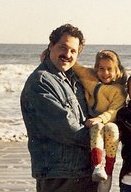 It was cold in the graveyard on January 31st, 2010, and there was a lot of traffic in the hearse, because we were in Long Island. After the funeral, everyone went directly to my Uncle’s house, where a feast of bagels and pickles awaited us. Shiva is the word for the seven-day mourning period that a Jewish family observes after the death of a first degree relative. My family did not sit for seven days, but instead sat for the customary three days that many reform families go by. People drift in and out of the house, bringing food and company, and the family allows time to wash over them.
It was cold in the graveyard on January 31st, 2010, and there was a lot of traffic in the hearse, because we were in Long Island. After the funeral, everyone went directly to my Uncle’s house, where a feast of bagels and pickles awaited us. Shiva is the word for the seven-day mourning period that a Jewish family observes after the death of a first degree relative. My family did not sit for seven days, but instead sat for the customary three days that many reform families go by. People drift in and out of the house, bringing food and company, and the family allows time to wash over them.
I didn’t bathe, and it wasn’t until later that I learned that a daughter is not supposed to bathe during Shiva. I didn’t brush my teeth, but that was my own personal flair, not the Bible. I barely spoke to anyone, my hair was in mats, and sitting in denial and my own filth, all I wanted to do was go back to school. My absence note went as follows:
“Please excuse Caitlin from missing school yesterday, she was sitting Shiva for her late father.”
I wrote it myself.
I relished the looks on teachers’ faces if they understood, and I was disappointed if they didn’t catch the reference. Finally, in tenth period, my Chemistry teacher gave her condolences and commended me for returning to school so quickly. That was what I was craving – to show everyone how tough I was. My dad died and I only missed one day of school. Describing my emotional state as denial would be an understatement.
It was incredibly naïve to rush myself back into the daily grind, and it was foolish of me to pride myself on poor decision-making. One absence from school was a sham. I would miss countless more days from the  aftermath of my father’s death, and that’s not even counting the majority of days I spent as a vapid shell in the classroom, too tired and hurt to absorb information. Too many days I woke up wishing I could sit Shiva again, so that I could be alone with my grief. I wasted the sympathy of my educators and peers, and when the time came when the work proved too much and I was on the verge of an emotional meltdown, most of them didn’t understand why I wasn’t “already over it.”
aftermath of my father’s death, and that’s not even counting the majority of days I spent as a vapid shell in the classroom, too tired and hurt to absorb information. Too many days I woke up wishing I could sit Shiva again, so that I could be alone with my grief. I wasted the sympathy of my educators and peers, and when the time came when the work proved too much and I was on the verge of an emotional meltdown, most of them didn’t understand why I wasn’t “already over it.”
I think that I still pay for shirking Shiva. When I can’t get out of bed in the morning (usually around once a week), I think, why didn’t I take the time to heal? Why am I doing this now? If I had any foresight, I never would have pushed myself back into school so early. I wish I had taken weeks off to grieve for my father’s death, because that opportunity is long gone. I have no valid excuses for not getting my work done or missing class today, and it re-opens the wound every time I retread my perpetual explanation: that I am still not okay, and I need time.
I am not discussing Shiva in this post as it pertains to Jewish tradition, but more as it interacts with the grieving process. For me, Shiva is a perfect example of that period of time after a tragedy where it is socially acceptable to be a wreck. Food is brought to you and no one expects you to look presentable or return to normalcy, although normalcy is what many of us yearn for at this time. Shiva feels inevitable, and in it’s inevitability I could not wait for it to be over. I think I had the false sense that if I could sit for three days and go home, my problems would stay at my Uncle’s house. When denial wears off, and you enter a new, poignant period of grieving, often you have lost the shock value that a death in the family brings to those around you. How could I explain to someone now that sometimes I still skip a shower or two, and sit in my own filth to grieve? That I still want to hibernate to escape the reality of my Dad being gone? Grieving for my father has been a very long process, but the window to do it openly has been woefully small.
